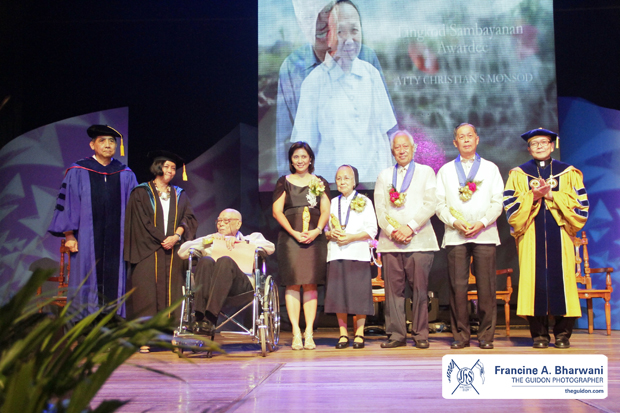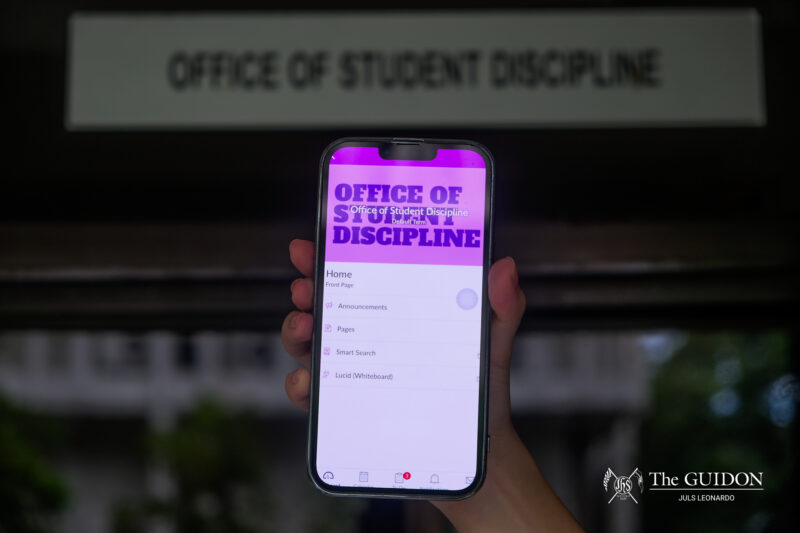FOR RESPONDING to the call to be men and women for others, five individuals were recognized during the Special Academic Convocation held at the Henry Lee Irwin Theater last July 16.
The recipients of the Traditional University Awards include the following: Dr. Edmundo Nolasco, PhD, former Department of Interior and Local Government (DILG) Secretary Jesse Robredo, Atty. Christian Monsod, Sr. Michelle Gamboa, RGS and Dr. Resil Mojares, PhD.
They received the Lux-in-Domino Award, the Government Service Award, the Parangal Lingkod Sambayanan, the Bukas Palad Award and the Gawad Tanglaw ng Lahi, respectively.
Working with the poor
Nolasco received the Lux-in-Domino Award for dedicating much of his life to fighting alongside Filipino workers in their struggle for just compensation and humane work conditions.
The award is given exclusively to alumni who exemplify the Ateneo’s identity as a Filipino, Catholic and Jesuit university.
Nolasco’s experience as a messenger-janitor after the Second World War “opened his eyes to the harsh conditions of unorganized workers.”
Nolasco then established and led various labor unions such as the Federation of Free Workers, which passed the 1953 Magna Carta of Labor into law.
He also set up the Industrial Unions Congress, which pioneered labor-organizing work for Manila’s leading department stores in the 1960s.
In his acceptance speech, Nolasco expressed his gratitude for the Ateneo’s recognition of his work, adding that he accepts it “in behalf of the many Ateneo graduates who have taken the same path [of working for social justice] and have worked in quiet and uncelebrated ways… but always working to be the best that they can be to be men and women for others.”
Opportunity for magis
Meanwhile, Robredo was given the Government Service Award for his legacy of transparent and participatory governance.
The award is given to government officials who exemplified integrity, competence, dedication and sound judgment in their governance and public service.
Robredo’s wife, 3rd District Camarines Sur Congresswoman Leni Robredo, accepted the award on behalf of her husband, who died in an airplane crash on August 18, 2012.
Before heading the DILG, Robredo held the post of mayor of Naga City’s in 1988, transforming it into the Bicol region’s premier city by the end of his 19-year term.
He also upheld transparency in government, for instance through a bulletin board at the entrance of the city hall that displayed all the city government’s financial transactions and project costs.
This system carried through to Robredo’s term as DILG Secretary with the implementation of the Full Disclosure Policy, which required local government units to publicly disclose the funds spent on projects.
Cong. Robredo said that she learned from her husband that giving people chances to excel is one of the “greatest gestures” of a leader to his people.
“In Ateneo’s words, give the people the opportunity of doing magis,” she said.
Continuing the fight
Monsod received the Parangal Lingkod Sambayanan for his commitment to agrarian and electoral reforms.
The award is given to individuals or organizations that exhibit outstanding public service.
Monsod was the secretary-general of election watchdog National Citizens’ Movement for Free Elections, which exposed anomalies in the results of the 1986 snap polls.
He is also widely known for his advocacy of land distribution for farmers. As a member of the 1986 constitutional commission, Monsod pushed for the inclusion of a section on agrarian reform in the charter.
In 2011, Monsod was the lead counsel of the Hacienda Luisita farmers-beneficiaries who urged 14 members of the Supreme Court to call for the distribution of the 4,300-hectare sugar plantation.
Despite all his achievements and work for the poor, Monsod acknowledges that, “there is still much to be done before [my work is] considered accomplished, which means I still have work to do to earn this award.”
He says the same with regard to his involvement in the elections and government.
Monsod is currently fighting alongside the Casiguran locals and indigenous people against the establishment of the Aurora-Pacific Economic Zone and Freeport.
Forty years for the poor
Gamboa received the Bukas Palad Award for her 40 years of aiding farmers, farm workers and indigenous people.
The award is given to individuals who embody the Ignatian spirit of generosity.
Known for empowering the poor and marginalized to be self-sufficient, Gamboa held dialogues between farm workers and planters in her home province of Negros Occidental.
In order to decrease the brewing tension in worker-planter relations, the cooperative she organized devised land sharing schemes even before a land reform program was implemented by the government.
From the 1980s up to the 1990s, Gamboa also managed food relief programs together with the Assisi Development Foundation for the poor and indigenous people in Visayas and Mindanao.
In 2000, Gamboa also assisted the aforementioned foundation in their relief and rehabilitation program for the many people in Mindanao who were displaced by the “all-out war” between the Estrada government and the Moro Islamic Liberation Front.
Nationalism as existential
Mojares, professor emeritus of the University of San Carlos in Cebu, received the Gawad Tanglaw ng Lahi for his scholarly works that enriched the Philippines’ intellectual and cultural landscape.
The award is given to those who have contributed to the clarification, development and enhancement of the essential Filipino image.
One of Mojares’ books, Brains of the Nation, is considered one of the most important works in Philippine history for its chronicle of the lives of three pioneering intellectuals: Pedro Paterno, Trinidad Pardo de Tavera and Isabelo de los Reyes.
“[I] was intrigued by their works on ‘ancient Filipino civilization’ which had been largely ignored by the historians,” said Mojares, as quoted in the convocation’s program booklet.
In his speech, he said that talking about history and culture, especially that of the Philippines, was “not something… intellectual.”
“Scholars investigate nationalism as a problem,” he said. “But for one who writes about the Philippines and lives in the Philippines and not having thought even once of actually leaving it, nationalism… is simply existential. It is our family, friends and environment.”







